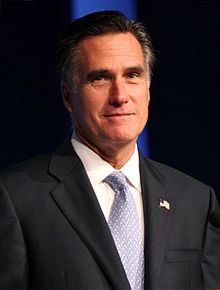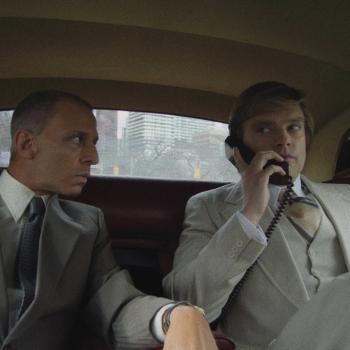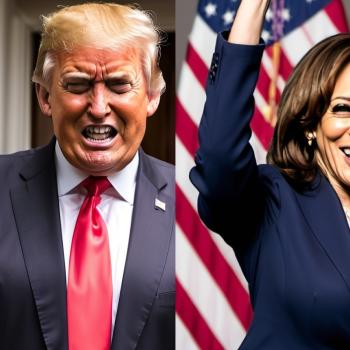 Be careful what you wish for. Many American Evangelicals are no doubt approaching the forthcoming elections with a sense of apprehension. And well they should, but for different reasons than perhaps they realise. I appreciate that I comment as an outsider on goings on in the USA at what I perceive as a time of national madness that comes round every four years (although with midterms, perhaps it never stops!). But, I think that very separation helps me to see things differently, and after all I live in a fellow English-speaking nation (not to mention, how shall I put it delicately, our longstanding relationship of years gone by!)
Be careful what you wish for. Many American Evangelicals are no doubt approaching the forthcoming elections with a sense of apprehension. And well they should, but for different reasons than perhaps they realise. I appreciate that I comment as an outsider on goings on in the USA at what I perceive as a time of national madness that comes round every four years (although with midterms, perhaps it never stops!). But, I think that very separation helps me to see things differently, and after all I live in a fellow English-speaking nation (not to mention, how shall I put it delicately, our longstanding relationship of years gone by!)
I won’t talk in this post about the obvious concerns many Evangelicals have about a second Obama term from the perspective of the further erosion of Christian values, for example on abortion, except to say that it does seem to me those values are already pretty eroded. I do understand that there is a big difference bewtween the parties and candidates on this issue: Romney is broadly pro-life and Obama seems to support abortion on demmand and Biden appears incoherent on the subject. One does, however, have to wonder exactly what the next Republican president of the USA would be able to actually do about this issue. There have been Republican Presidents since Roe vs Wade, and none of them actually showed any real signs of rescinding the abortion mandate that has killed a generation, with a clear bias towards African Americans, representing a form of genocide.
Many Evangelicals have been accused of being single-issue voters on abortion over their consistent support for Republicans. But, I suspect for many, it is not merely the abortion position that has led them to reflexly vote against Democrats. Rather, it is the idea that the Republican candidate is “one of us” or at least “almost one of us.” Republicans presidential candidates have a tendency to position themselves sufficiently closely to the Evangelicals, that as a block most of them vote for their “friends.” In this election, Romney has a problem with this as he is a Mormon.
Some Evangelicals, usually without really thinking this issue all the way through, are really struggling with whether or not they should vote for a man who follows a religion many Evangelicals have historically dismissed as a “cult.” If Romney is not a Christian, the argument goes, why should Christians help him get into the White House? I can understand such a perspective, but if an individual’s faith is allowed to become a defining issue in a person’s candidature, this could lead to consequences no Evangelical would desire.
Currently in the USA, there is an assumption that the President will be loosely some form of Christian. Despite appearances to the contrary, however, there is already a strong undercurrent that candidates must not be too strongly religious. There are some strong parallels to the UK situation on this point. As still officially a Christian nation, with an established protestant church, our Prime Ministers have to be nominally Christians. Part of their role is to appoint Bishops, and they are expected to be involved in many national events with religious overtones. The establishment of the Anglican church still runs so deep in our country that, Tony Blair felt he must delay his conversion to Catholicism until after he resigned as PM. And yet, Blair was famously interupted during an interview by his communucation expert with the phrase “we don’t do God.” In the UK it is already the case that politicians fear being too open about their religious beliefs, especially if those beliefs are strong.
Imagine if you will a candidate for office in some future Presidential election who is actually a practicing evangelical. Imagine a media elite turning against him or her. The previous rejection of a Mormon as holding religious views that are too extreme for office may well come back to bite that strongly evangelical candidate. Emboldened by the collaboration of evangelicals this time round, it will be only too easy for the media to turn some of the same arguments back on one of our own. Evangelicals might want to think carefully before they argue that Mormon beliefs sound strange or even extreme to those who don’t hold them. It is only too easy for people to say that our views sound just as strange. We are overly familiar with our own ideas, and often fail to realise how preposterous they sound to outsiders. How strange it must appear to unbelievers that we actually believe that a man who lived 2000 years ago really did die for us, rise again from the dead, and is now ruling in heaven and living in our hearts?
As we face an increasingly hostile society, and on both sides of the Atlantic militant secularists are trying to construct an atheocracy, it is an ideal time for us to clearly state that we are in favor of freedom of religion for everybody. If we want to continue to be free to function as full members of society despite holding views that others think are bizarre, we must argue for the right of others to hold beliefs we ourselves believe are bizarre. We must, in other words, not try and claim that it doesn’t matter what we believe, but rather than everybody must be free to hold different religious views and to hold them strongly. Romney’s Mormonism per se should hold no weight in the religious campaigns, provided it can be demonstrated that he supports religious freedom for all. Unless evangelicals genuinely believe that Romney will try and impose his Mormonism on the whole of America, then it really shouldn’t matter. For, we cannot with one breath say we fear the consequences of a Morm0n in the White House, while expecting others not to fear a future Evangelical challenger. Imagine the horror among many American Christians if it was a Muslim standing for office? Then realise that many feel exactly that way about us. Muslim, Mormon, Evangelical, even Atheist, it really should count for nothing, provided the candidate supports true freedom for all, and has policies we broadly agree with.
Unfortunately, it is perhaps the case that this post is an example in attempting to lock the stable door after the horse has bolted. Non-evangelical America is already so distrustful of evangelicals, it seems they are much more likely to elect a Mormon than they would ever consider electing an Evangelical. Can you imagine an evangelical with as much conviction as Billy Graham wining a nomination battle, let alone the presidency? I am afraid that short of an absolute miracle, I could also not conceive of us in the UK electing an evangelical Prime Minister – it has been hard enough to even get evangelicals elected to parliament — as a friend of mine found to great personal cost at the last British election. Have we ourselves been, at least in part, the cause of this division?
 Content Director’s Note: This post is a part of our Election Month at Patheos feature. Patheos was designed to present the world’s most compelling conversations on life’s most important questions. Please join the Facebook following for our new News and Politics Channel — and check back throughout the month for more commentary on Election 2012. Please use hashtag #PatheosElection on Twitter.
Content Director’s Note: This post is a part of our Election Month at Patheos feature. Patheos was designed to present the world’s most compelling conversations on life’s most important questions. Please join the Facebook following for our new News and Politics Channel — and check back throughout the month for more commentary on Election 2012. Please use hashtag #PatheosElection on Twitter.













